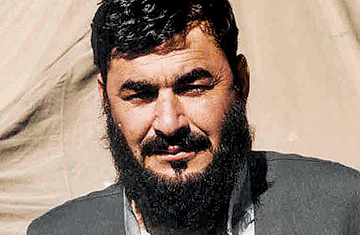
Bashir Noorzai, an Afghan who is on the United States' list of most wanted drug kingpins.
For a week and a half in April 2005, one of the favorite warlords of fugitive Taliban leader Mullah Mohammed Omar was sitting in a room at the Embassy Suites Hotel in lower Manhattan, not far from where the Twin Towers of the World Trade Center once stood. But Haji Bashar Noorzai, the burly, bearded leader of one of Afghanistan's largest and most troublesome tribes, was not on a mission to case New York City for a terrorist attack. On the contrary, Noorzai, a confidant of the fugitive Taliban overlord, who is a well-known ally of Osama bin Laden's, says he had been invited to Manhattan to prove that he could be of value in America's war on terrorism. "I did not want to be considered an enemy of the United States," Noorzai told TIME. "I wanted to help the Americans and to help the new government in Afghanistan."
For several days he hunkered down in that hotel room and was bombarded with questions by U.S. government agents. What was going on in the war in Afghanistan? Where was Mullah Omar? Where was bin Laden? What was the state of opium and heroin production in the tribal lands Noorzai commanded--the very region of Afghanistan where support for the Taliban remains strongest? Noorzai believed he had answered everything to the agents' satisfaction, that he had convinced them that he could help counter the Taliban's resurgent influence in his home province and that he could be an asset to the U.S.
He was wrong.
As he got up to leave, ready to be escorted to the airport to catch a flight back to Pakistan, one of the agents in the room told him he wasn't going anywhere. That agent, who worked for the Drug Enforcement Administration (DEA), told him that a grand jury had issued a sealed indictment against Noorzai 3 1/2 months earlier and that he was now under arrest for conspiring to smuggle narcotics into the U.S. from Afghanistan. An awkward silence ensued as the words were translated into his native Pashtu. "I did not believe it," Noorzai later told TIME from his prison cell. "I thought they were joking." The previous August, an American agent he had met with said the trip to the U.S. would be "like a vacation."
Today, Noorzai, 43, sits in a small cell in the high-security section of Manhattan's Metropolitan Correctional Center, awaiting a trial that may still be months away. But whatever his fate, the Case of the Cooperative Kingpin raises larger questions about America's needs, goals and instincts in fighting its two shadow wars: the war on terrorism and the war on drugs. The question that continues to haunt U.S. policymakers in this long struggle is, When do you bend the rules for one to help the other? Afghanistan is where these two battles converge, as the runoff from the $3 billion opium trade helps pay for the guns and bombs being deployed against U.S. and NATO forces.
